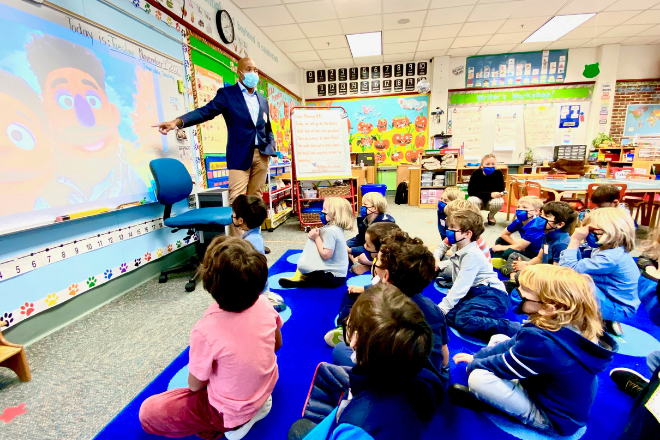Interview by Cecily Garber
Derrick Gay, Ed.D., is an internationally recognized consultant to schools, businesses and nonprofit and arts organizations on issues of strategic inclusion and equity. Over the past 24 years, he has partnered with more than 500 organizations to deepen their diversity and inclusion capacity; attract, hire, and retain the best talent; and maximize business and education goals. In addition to his direct work in the preschool-grade 12 world, Gay has been featured in the New York Times, Washington Post and NPR and has produced two TEDx talks. He taught in several independent schools before launching his consultancy.
Net Assets: The world has changed since we last spoke almost exactly two years ago. You continue to travel and consult on issues of diversity, equity and inclusion within schools and other organizations. Have your interactions with school leaders and community members shifted in notable ways, with heightened calls for social justice following the murder of George Floyd; the Black At movement on social media, in which students, alumni and families of color in the independent school community brought forward painful experiences within their schools; and debates about teaching critical race theory?
Derrick Gay: The short answer is yes — and no. Certainly the murder of George Floyd was a watershed moment, not only for the United States, but around the world. I'm working in France, Italy, Hong Kong, Guatemala, Brazil, and Canada right now, and people in those countries are also naming George Floyd as an important moment in their histories around not only racial or ethnic inclusion, but inclusion more broadly. There's a sense that a greater swath of our population understands that something's not right — that these aspirations that we have around inclusion, belonging and justice are not fully realized for everyone.
In independent schools in particular, I have seen greater participation from constituents that typically weren't included in this work or didn't quite understand how their role could be leveraged to advance this work. Previously the work had been largely focused on students, faculty and other student-facing constituents. So staff in the admissions and advancement offices, the director of communications, the CFO, the business office staff — those individuals weren’t necessarily attending professional development around this work because they didn’t understand how their role might fit into it. And because they aren’t classroom teachers, areas like child psychology, intercultural competency, stereotypes and bias haven’t necessarily been part of their professional formation and formal education.
In short different groups of staff members are getting involved more, and opportunities for professional development are becoming more tailored.
Net Assets: Have effective strategies for increasing diversity, equity and inclusion within school communities shifted during this time?
Gay: I believe that schools are still in the process of learning. Some schools went from zero to 300 miles per hour [in changing curriculum, policies, etc.] because awareness was so great after not only the murder of George Floyd but also heightened racism for Asian-American and Pacific Islanders during the pandemic and the events of January 6, 2021. The catalysts were so strong, and many schools moved forward very quickly — sometimes too quickly, without first having an adequate foundation or strategy around this work.
As a result, we saw what had been a dormant resistance or apathy transition into brazen and thunderous resistance. This happened, in part, because of the content of the work; in part, because of the presentation; and in part because schools, even with the greatest of intentions, weren't sufficient in supporting individuals with education and awareness before advancing at full speed around some of these efforts. So it’s often not a question of the legitimacy of the work, or the moral imperative, or mission alignment, but rather a question of the school's readiness for the work and the strategies to advance these efforts.
And if you don't see resistance, it doesn't mean it's not there. So schools should expect some degree of resistance, which is part of our imperative as schools, and also foster a strategy to acknowledge the resistance, educate around it and provide support for it, to get as many people on board as possible.
In terms effective strategies in this environment, I’ll share far more in the keynote, but briefly, I will say that we should look at this from a different perspective, from a change management perspective. We should expect that whenever there is a type of systemic change within a system or an institution, we should expect that there is going to be dissonance. People are going to process it in different ways. I would say that given the magnitude of some of the shifts that schools are engaging in, we should not be surprised that we're seeing resistance.
And if you don't see resistance, it doesn't mean it's not there. So schools should expect some degree of resistance, which is part of our imperative as schools, and also foster a strategy to acknowledge the resistance, educate around it and provide support for it, to get as many people on board as possible. You're not going to get everyone, but you want enough to be effective.
Net Assets: You’ve said that we need to hear the keynote to learn more. What can Annual Meeting attendees expect from your talk and the discussion that follows?
Gay: I would say that what's most important about this closing keynote is to provide a space for folks to consider how they can be active agents to advance inclusion and belonging for everyone, from both a personal perspective and from their role in independent schools. I will provide specific strategies from within a tailored framework, not from the framework of a science teacher, or a history teacher, but from the perspective of the constituents that are represented at NBOA — those that work in the business office and school administration.





